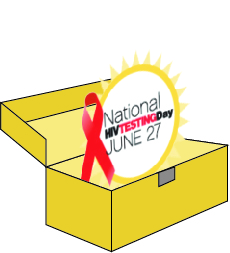A Box of Tools for National HIV Testing Day 2011
Topics

Co-authored by Deb LeBel, Partnerships Specialist, HIV.gov
This is the season for toolboxes. Sunday was Father’s Day – and tools are a popular gift for dads. Summer is the time when many of us pull out our toolboxes to work on home improvement or hobby projects.
So that got us thinking about the “tools” we have in our HIV prevention, testing and treatment “toolbox”.
With National HIV Testing Day (NHTD) coming up on June 27, we wanted to highlight some social media tools that can help support and promote the NHTD theme, Take the Test. Take Control.Here are some examples:
- In this new CDC podcast, Dr. Kevin A. Fenton, Director, National Center for HIV/AIDS, Viral Hepatitis, STD, and TB Prevention at CDC, discusses NHTD.
- The HIV/AIDS Prevention & Service Provider Locator is a first-of-its-kind, location-based search tool that allows you to search for HIV testing services, housing providers, health centers and other service providers near your current location. The Locator widget helps you to share this tool by embedding the code on your website or blog.
- Mobile phone users can send a text message with their ZIP code to KNOWIT (566948) and receive a return text with an HIV testing site near them. Share this tool with one of these badges.
- On Twitter, hashtag #NHTDExit Disclaimer can help you and your audience talk about HIV testing, promote NHTD 2011 events, and more.
- Members of the national observances web community are talking about NHTD 2011.
These are just some of the many “products” that we can use, repurpose, and share with those we know we want to reach on NHTD and beyond. These ready-to-use tools reflect the ways in which social media can support education and behavior change, streamline effort, and capitalize on common messaging.
As we continue to commemorate “30 Years of AIDS†So here are our questions for you:
- If you use tools that others created for HIV awareness, how do you decide what to use?
- What makes a tool most useful for your work in HIV prevention, care, and treatment services, or in other areas of HIV awareness?
We look forward to hearing from you!